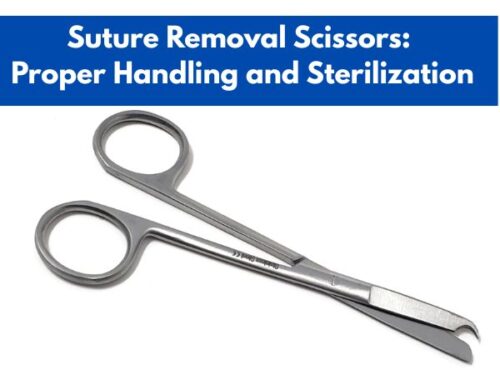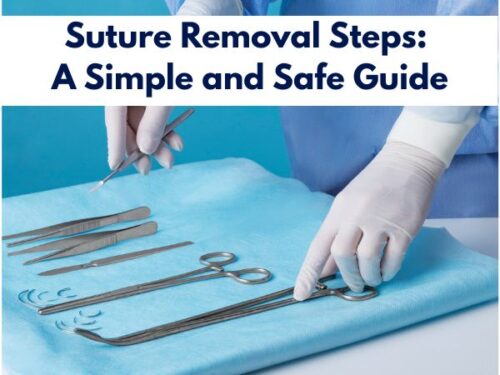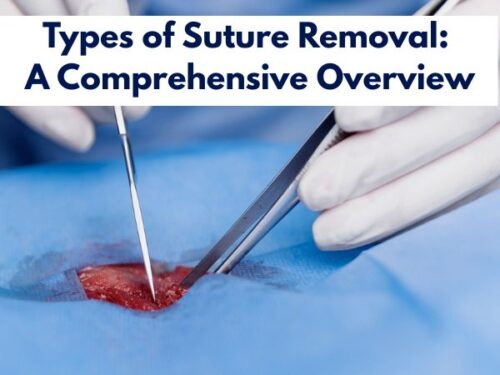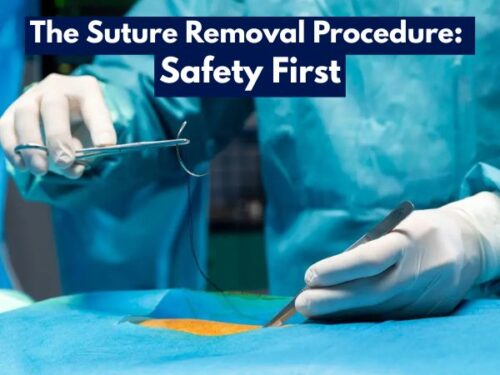Sterile Water vs Normal Saline for Wound Care: Which is Better?
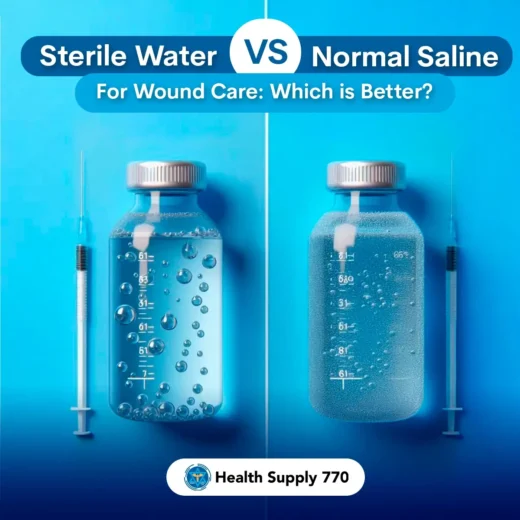
Sterile Water vs Normal Saline for Wound Care: Which is Better?
As per the Centers for Disease Control and Prevention (CDC), approximately 57.5 million Americans pay a visit to the doctor’s office for the management of injuries. In most of these cases, the wounds are severe and need proper care so that the risk of wound infections can be eliminated. When it comes to managing these injuries, both sterile water vs normal saline for wound care are recommended. However, despite being effective, there is a superiority of normal saline over sterile water.
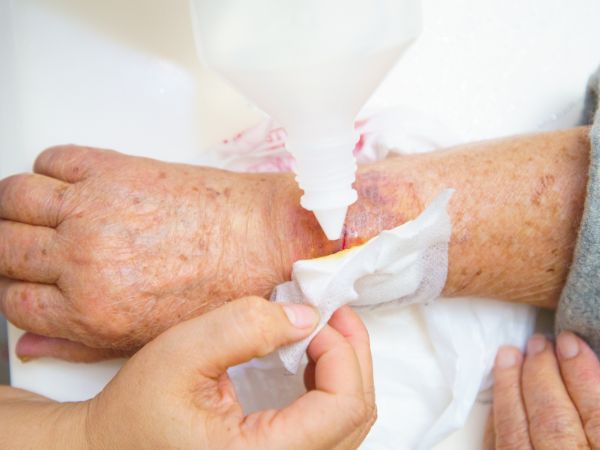
The use of sterile water vs normal saline for wound care prevents delayed wound healing
In this article, let us draw a comparison between sterile water vs normal saline for wound care and deduce which one of these should be chosen while cleaning and rinsing the wounded area.
What is Sterile Water?
Sterile water is a hypotonic solution that is free from pyrogens. Being nontoxic, sterile water does not cause fever or other issues when used either externally or as an injectable solution. However, its hypotonic nature poses a risk to body cells which break down when exposed to sterile water. Sterile water is also free from organic substances while trace amounts of inorganic substances are present.
Use in Wound Cleansing
The use of sterile water for wound cleansing has been a practice in healthcare facilities for a long time now. It provides the following benefits when used for wound care:
Benefits
The following benefits have been associated with using sterile water for wound care:
- Sterile water cleans the wounds effectively and thoroughly.
- It is a great alternative to normal saline when the latter is not available.
- Between the sterile water vs normal saline for wound care, the sterile solution is less expensive than the sterile normal saline solution. That’s why, it is more budget-friendly and is often preferred by healthcare setups as well as by the caregivers who are handling wounded patients in home settings.
Drawbacks and Potential Risks
The following drawbacks have been associated with sterile water:
- Sterile water cannot be employed during surgical procedures as the body tissues absorb it and swell.
- Body cells tend to absorb sterile water and then burst afterward due to fluid overload.
- The use of sterile water on the wounded area can cause pain to the patient. Therefore, analgesics are required.
- Sometimes, the use of sterile water can increase purulent discharge from the wound. This refers to the flow of a viscous whitish fluid that has an unpleasant order.
- Studies have shown no significant difference in the wound infection rates while using tap water versus sterile water.
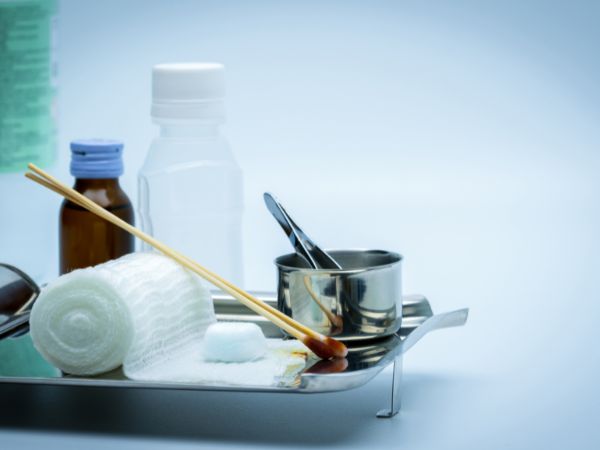
A wound cleanser is an essential component of wound care kits
What is Normal Saline?
Normal saline (NS) refers to an aqueous solution of sodium chloride which has a percentage concentration of 0.9%. Being an isotonic solution, normal saline solution has the exact tonicity as that of our blood. That’s why, our tissues and cells do not burst or break down with the use of NS. In addition, the solution is non-toxic and therefore does not cause damage.
Use in Wound Irrigation
Between sterile water vs normal saline for wound care, normal saline is extensively used when it comes to cleaning wounds. In this regard, it provides the following benefits:
Benefits
When we use normal saline for wound irrigation, the following benefits are expected to be achieved:
- Having the same tonicity as that of our blood and fluids, normal saline does not harm our body cells.
- Debris collected at the wounded area can be easily cleared with the employment of normal saline.
- The toxicity associated with normal saline is minimal which is why it is considered safe.
- Because of the absence of any preservatives as well as additives, normal saline is non-irritant to the skin and body tissues.
- Normal saline solution is inexpensive and can be purchased in small concentrations starting from USD$10.
Drawbacks and Potential Risks
Despite being a preferred choice for wound cleansing, the normal saline depicts the following drawbacks:
- Normal saline is not a good choice for cleaning the necrotic tissue.
- Normal saline does not work well when it comes to cleaning dirt from the wounds.
- As normal saline does not have any antimicrobial additive, it is not effective against normal bacterial flora which is often associated with infections at the wounded tissue. Rather, a broad-spectrum antimicrobial solution should be preferred if the risk of infection is higher.
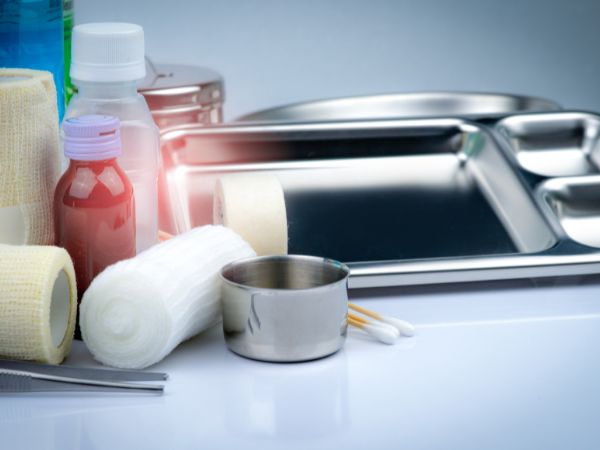
Sterile water vs normal saline for wound care should be employed while dealing with all kinds of wounds
Sterile Water vs Normal Saline for Wound Car: Comparison
The healing of surgical wounds as well as traumatic injuries requires acute wound irrigation. This is done by using appropriate irrigation solutions which cleanse wounds and reduce the risk of infections. Two of the most commonly used irrigation solutions i.e. sterile water vs normal saline for wound care have been differentiated below in terms of their properties:
| Properties | Sterile Water | Normal Saline (NS) |
| Composition | No electrolyte | 0.9% Sodium chloride |
| pH | 5.0 to 7.0 | 4.5 to 7.0 |
| Osmolarity | 0 mOsm/L | 286 mOsm/L |
| Tonicity | Hypotonic | Isotonic |
| Antimicrobial Properties | Absent | Absent |
| Toxicity | Minimum | Minimum |
| Incidence of Purulent Discharge | High | Minimum |
| Pain Associated with Solution Use | ✔ | ✘ |
| Suitability for Wounds | Small wounds, Acute soft tissue wounds | Minor cuts, Scrapes, Burns |
| Unsuitability for Wounds | Surgical wounds | Necrotic wounds, Dirty wounds |
Choosing the Right Wound Care Solution
Choosing the right irrigation solution for a wound depends upon the type and nature of the injury. Most wounds can be cleaned and irrigated by using sterile water vs normal saline for wound care. However, the following section further narrows down the selection process:
Acute Wounds
Between sterile water vs normal saline for wound care, normal saline should be given preference for acute wounds. Healthcare professionals consider normal saline to be the irrigation solution of choice. This is because of its non-irritant and non-toxic nature. The solution is safe for our cells and that’s why cleans the acute injuries without damaging our tissues.
Chronic Wounds
Although normal saline works fine on chronic wounds as well, some broad-spectrum antimicrobial solutions such as polyhexanide can also be employed as an additional irrigation solution. In this case, normal saline will clear out the debris effectively while the polyhexanide antiseptic solution will ensure that the area remains free from harmful infection-causing bacteria such as P. aeruginosa, methicillin-resistant Staphylococcus aureus (MRSA), etc.
Surgical Wounds
To clean surgical wounds, multiple strategies can be adopted. For instance, the use of antimicrobial solutions in conjunction with normal saline is proven to be effective in controlling the incidence of microbial infections. In addition, the employment of hydrogen peroxide aids in the removal of debris from the wounded area. If the wound has been contaminated with greasy substances, soap can also be utilized.
Necrotic Wounds
To manage necrotic tissue wounds, normal saline is proven to be ineffective. Rather, the use of sodium hypochlorite is recommended. This is because the sodium hypochlorite or, as it is often called, Dakin’s solution has bactericidal action which prevents infections in open wounds.

Proper care of the wounds and surrounding skin effectively reduces the infection rates
Wound Irrigation Solutions at Health Supply 770: Features and Specifications
Wound care is an essential practice in healthcare as properly managed acute and chronic wounds take less time to heal and the patients return to their normal life activities in a shorter duration. In this regard, the use of sterile water vs normal saline for wound care is often recommended. Although both of these are effective in shortening the healing process.
Considering the importance of sterile water vs normal saline for wound care, many different irrigation solutions are available in the US market. The following section covers some of the widely employed wound cleansing solutions that are available at Health Supply 770 and have been detailed below along with their features and purchase links:
Baxter 2F7122 Irrigation Solution 0.9% Sodium Chloride (24/CS)
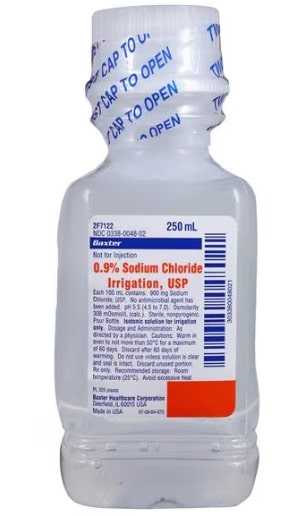
US$314.88
Product Details
Baxter 2F7122 irrigation solution USP is prepared by dissolving 0.9% sodium chloride in sterile water. The product is employed for washing acute wounds and is considered better than tap water because of the absence of organic as well as inorganic ions in it. The pH value of the irrigation solution is between 4.5 to 7.0 with an osmolarity of 308 mOsm/L.
The solution comes in 250 ml packaging which is non-leaching and does not increase the risk of skin issues. This Baxter 2F7122 irrigation fluid is also non-pyrogenic which means it does not have the fever-causing pyrogens in it.
Despite its extensive uses for suture wounds, ostomy wounds, as well as necrotic wounds, the product is restricted to irrigation use only and should not be administered intravenously into the body. In addition, drinking irrigation solutions are also discouraged. Overall, the product is safe and does not carry any added preservatives.
B. Braun R5001-01 Irrigation Solution Water 500mL Plastic Injection Container 16 EA/CA
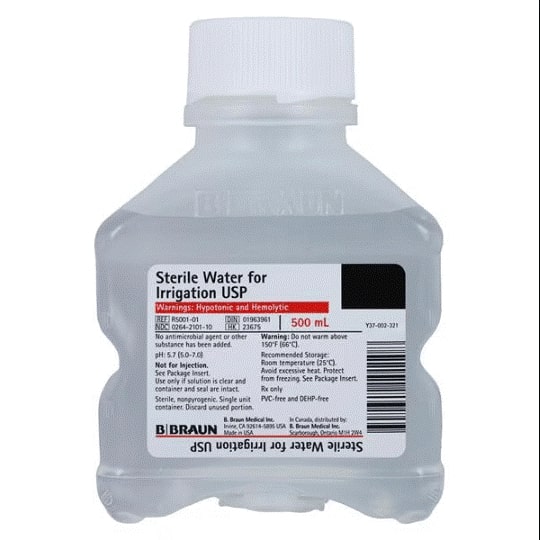
US$344.88
Product Details
Braun R5001-01 irrigation solution water is a product based on sterile water. It is employed as a cleansing solution on a wound bed. The product comes in a plastic container that is made up of safe construction material free from PVC as well as DEHP, chemicals often found in plastic containers.
In addition, the product is also free from natural rubber latex which is an irritant material. Hence, when it comes to choosing between sterile water vs normal saline for wound care, this B. Braun R5001-01 irrigation solution should be given preference.
B. Braun R5200-01 Irrigation Solution 0.9% Sodium Chloride, Preservative Free Not for Injection Bottle 1,000 mL
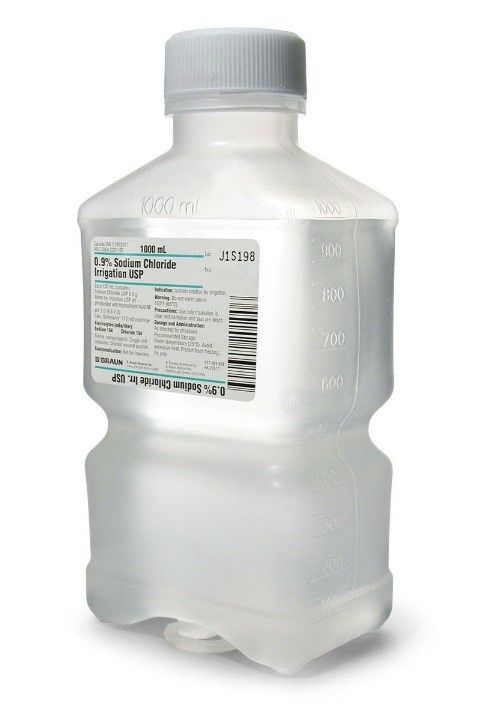
US$374.88
Product Details
Braun R5200-01 irrigation solution is prepared by using sodium chloride in the parentage concentration of 0.9% as its chief electrolyte. The solution contains sterile water as a vehicle. This sterile saline for wound repair comes in a capacity of 1000 ml.
The product finds applications in cleansing chronic wounds as well as acute traumatic wounds and managing the factors that are causing delayed healing. As B. Braun R5200-01 irrigation solution is particularly manufactured for washing the wound surface, it should not be administered intravenously or used for drinking purposes.
*Note: The prices mentioned in the article are taken from the Health Supply 770 website. They may vary over time.
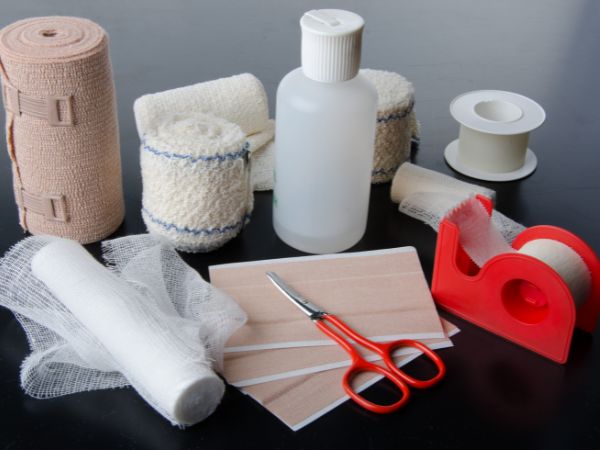
Sterile water vs normal saline for wound care are essential components of first-aid kits
The different brands of sterile water vs normal saline for wound care mentioned in the article, along with many other medical supplies, can be ordered from Health Supply 770, a reliable name when it comes to medical products. They have a 30-day money-back guarantee and provide your products to you in the shortest possible time. Click the link given in the article to check out and order the wide range of solutions for cleansing traumatic wounds.
Bottom Line
Wound care is one of the major areas in healthcare where patients come with chronic or acute soft tissue wounds as well as acute traumatic wounds. In addition, acute surgical wounds also need proper management to prevent wound infection. In this regard, irrigation solutions are employed which usually include sterile water vs normal saline for wound care.
Studies conducted on the comparison of tap water and sterile water vs normal saline for wound care reveal that no significant difference has been observed with the use of any of these three. Tap water, however, was found to reduce the infection rates in wounded individuals although there is insufficient evidence. Nevertheless, the use of sterile saline solution should be preferred because of sterility as tap water is not always meeting the national health standards.
Considering their importance as well as high utilization, it is best to stock up on sterile water vs normal saline for wound care as well as other IV solutions in healthcare facilities and in-home settings. For purchasing the different types of IV solutions including sterile water vs normal saline for wound care, reliable vendors like Health Supply 770 should be approached. They ensure the provision of quality products along with satisfactory services.
References
https://www.cdc.gov/nchs/fastats/injury.htm















